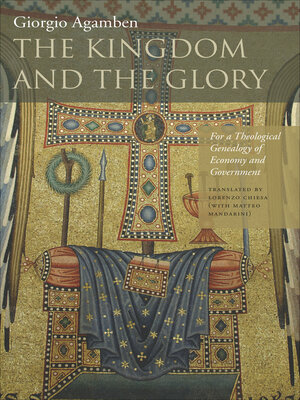The Kingdom and the Glory
ebook ∣ For a Theological Genealogy of Economy and Government · Meridian: Crossing Aesthetics
By Giorgio Agamben

Sign up to save your library
With an OverDrive account, you can save your favorite libraries for at-a-glance information about availability. Find out more about OverDrive accounts.
Find this title in Libby, the library reading app by OverDrive.



Search for a digital library with this title
Title found at these libraries:
| Library Name | Distance |
|---|---|
| Loading... |
The renowned philosopher expounds on the ideas he introduced in Homo Sacer with this analysis of the theological foundations of political power.
In the early centuries of the Church, in order to reconcile monotheism with God's threefold nature, the doctrine of Trinity was introduced in the guise of an economy of divine life. It was as if the Trinity amounted to nothing more than a problem of managing and governing the heavenly house and the world.
In The Kingdom and the Glory, Agamben shows that this theological-economic paradigm unexpectedly lies at the origin of many of the most important categories of modern politics. Its influence ranges from the democratic theory of the division of powers to the strategic doctrine of collateral damage, and from the invisible hand of Smith's liberalism to ideas of order and security.
Agamben also demonstrates that modern power is not only government but also glory, and that the ceremonial, liturgical, and acclamatory aspects that we have regarded as vestiges of the past actually constitute the basis of Western power. Through a fascinating analysis of liturgical acclamations and ceremonial symbols of power—the throne, the crown, purple cloth, the Fasces, and more—Agamben develops an original genealogy that illuminates the startling function of consent and of the media in modern democracies.
In the early centuries of the Church, in order to reconcile monotheism with God's threefold nature, the doctrine of Trinity was introduced in the guise of an economy of divine life. It was as if the Trinity amounted to nothing more than a problem of managing and governing the heavenly house and the world.
In The Kingdom and the Glory, Agamben shows that this theological-economic paradigm unexpectedly lies at the origin of many of the most important categories of modern politics. Its influence ranges from the democratic theory of the division of powers to the strategic doctrine of collateral damage, and from the invisible hand of Smith's liberalism to ideas of order and security.
Agamben also demonstrates that modern power is not only government but also glory, and that the ceremonial, liturgical, and acclamatory aspects that we have regarded as vestiges of the past actually constitute the basis of Western power. Through a fascinating analysis of liturgical acclamations and ceremonial symbols of power—the throne, the crown, purple cloth, the Fasces, and more—Agamben develops an original genealogy that illuminates the startling function of consent and of the media in modern democracies.







